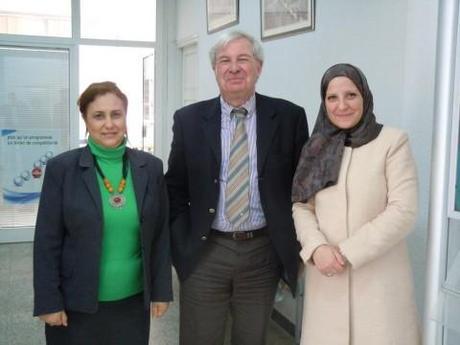
Louis Delcart is the Director of Internationalisation and Innovation at VOKA – Flanders’ Chamber of Commerce Halle-Vilvoorde. He is serving as a mentor to the Chamber of Commerce and Industry of the Centre through CIPE’s Knowhow Mentorship program.
Tunisia is, for us Europeans, a touristic paradise, like Spain or Turkey. But it is also a country with an ancient civilization, dating from centuries before: Queen Dido, Hannibal and the Carthaginians, Pompey the Great and his African conquests, the Beys of Tunis and the corsairs attacking European ships from the pirates near Mahdia. They all are part of 3,000 years of rich history.
It was also in this country that the Arab Spring started in 2011. Within three weeks time, the popular uprising chased out the country’s autocratic leader, Ben Ali. A democratic process was started, with the election of Ennahda, a moderate Islamic party, to power. After three years, the love of the people for its new government is over. But Tunisia’s subsequent political development has been different from its neighboring countries: a technocratic interim government was recently formed and a new constitution is being edited, discussed, and voted on article by article in the parliament. Tunisia is – at least to this point — not missing its turn towards democracy.
It is in this context that I was invited by CIPE to mentor a chamber of commerce in this country. I was given a choice between two regional chambers, and I selected the one with the most elaborate strategic plan, the Chamber of Commerce and Industry of Centre (CCI-Centre) in Sousse, which made me curious.
The contacts established through my first call with CCI-Centre were with two women leaders of the organization, the CEO and the Director of Cooperation and Economic Events. As soon as I spoke with them, I recognized the situation: the Tunisian chambers of commerce are squeezed between other state organizations with more disposable resources aiming to target the same group of companies. They had no unique selling proposition except for the quality the chamber delivered, but the management wished to survive and position its chamber in a more sustainable way.
But what did they expect from me? This was not clear: could I, a European only moderately acquainted with the North African context, provide enough added-value to them with their specific situation? So I decided to buy an airplane ticket — thanks to the financial support of the Flemish government who got interested in my initiative — and to visit them. Fortunately, Sousse is also a holiday destination, so it was not difficult to find a charter and a hotel room during wintertime at a reasonable price.
Once I sat down with my Tunisian counterparts and discussed in detail what their organization was facing, I understood the context and the role I could play. I recognized the situation: because of the revolution and the fact that the overall economy is not in a good shape, the CCI-Centre management had decided to improve its own organization to come out of the crisis stronger. A typical example of the adagio: crises are also opportunities.
With some foreign grants and technical assistance, CCI- Centre analyzed the organization’s strengths and weaknesses and developed a new strategy to provide the chamber with a more sustainable future. The assistance CCI-Centre received was helpful, but the consultants were unable to make their suggestions concrete, or maybe were too far from the reality of a chamber of commerce in a country with a population of 11 million.
On the first day I was confronted with the needs of CCI-Centre in several areas: export documents, human resources management, and international projects. To share best practices, I presented them the key performance indexes (KPIs) of my chamber of commerce in Belgium, the interpretation of the various accountancy principles of an international European project, and the digitization and remote monitoring and approval of export documents. All of these topics seemed to be an important added-value for them.
On the second day, we discussed the principles of customer relationship management (CRM) and the ways of encouraging staff members to use the system; how CCI-Centre could approach companies for sponsorship opportunities and emphasize the potential return on investment for their contribution; and the general concept of good citizenship. After a while, we all realized these topics were something that could not be immediately adopted in today’s Tunisia, so we decided to work on those issues in the near future.
My trip to visit the CCI-Centre was short but it was an invaluable experience to help me understand the situation of my mentee organization better. I look forward to continuing this mentorship and see how my coaching will improve CCI-Centre in the future.
KnowHow Mentorship connects associations around the world with the know-how they need to be a force for change. If you have experience in association management and would like to mentor a growing business association in a developing country, or if you are a business association looking for advice from an experienced chamber of association professional, visit the KnowHow Mentorship website.

